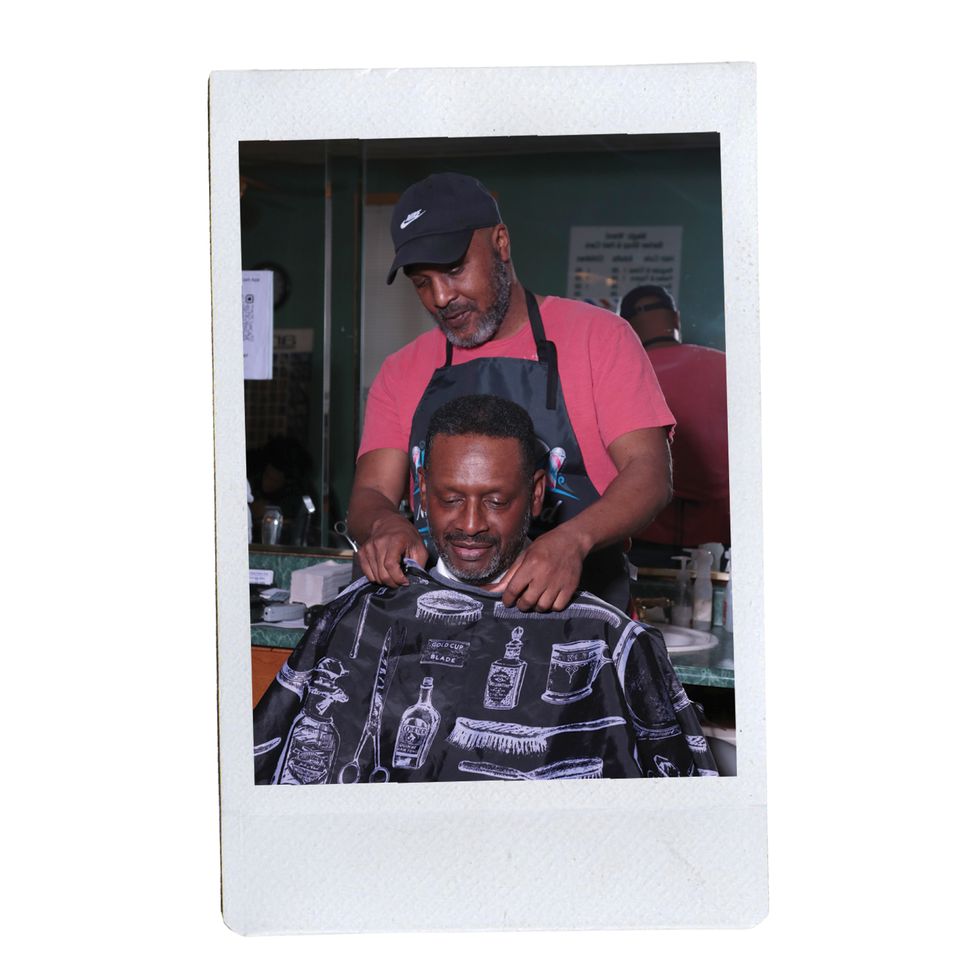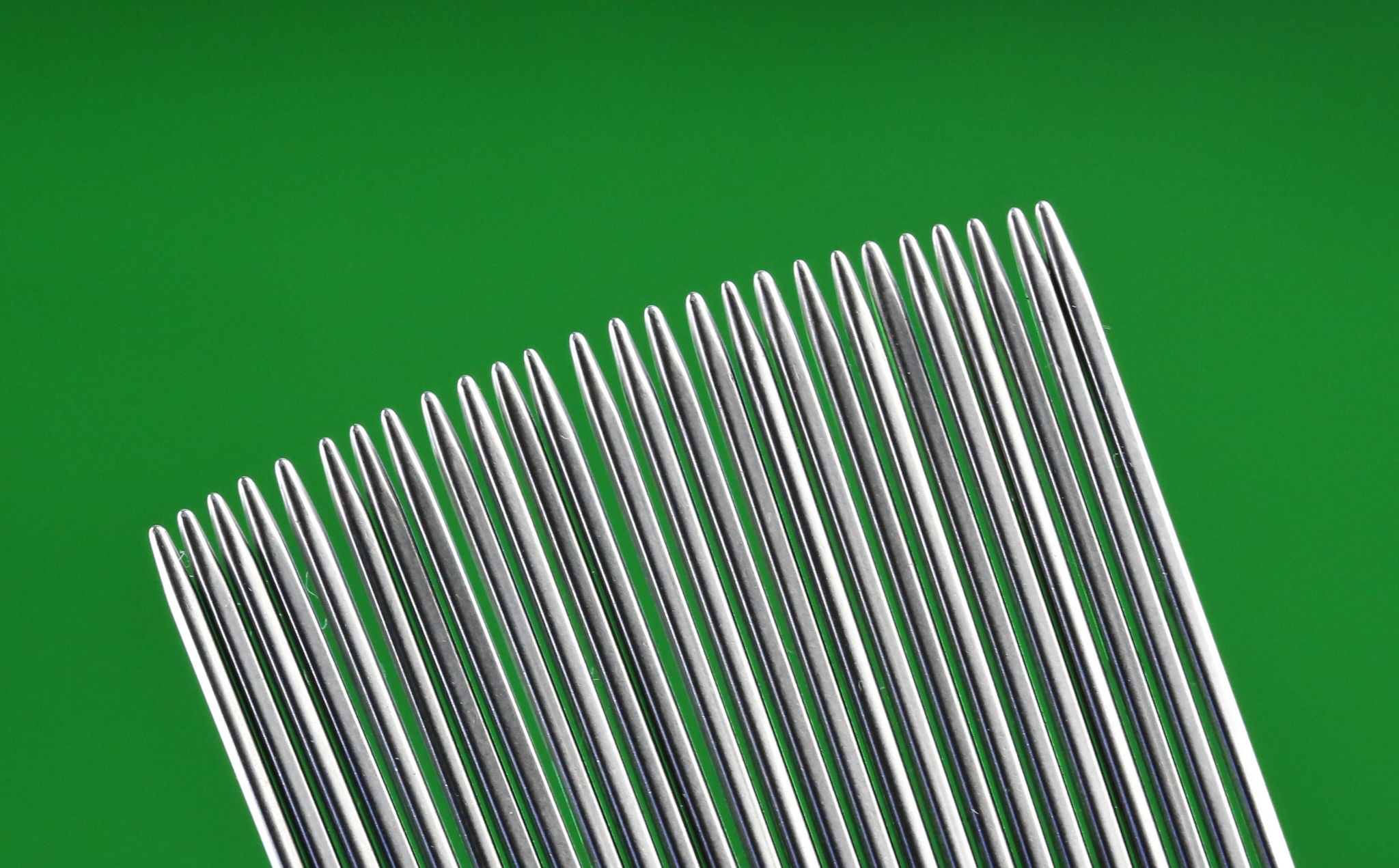Products You May Like
At the Magic Wand Barbershop in Baltimore, Maryland, there are only two rules: “Don’t touch the blinds, and don’t tell any lies,” says co-owner and barber Kevin Cooper. No one knows these rules better than my father.
For decades, barbershops and salons have been safe havens in the Black community. The ritualistic journey, whether weekly or bi-weekly, to see a hairdresser or barber is not only the first introduction to hair care, but also the first immersion into the culture, where a familial connection with your hair professional is established. Perched over the salon chair is the “auntie” who gave you your first silk press or wiped your tears after a big haircut; it’s the “uncle” who gave you your first line-up and cut the quintessential sharp line on the sides of your fade, even though your parents warned against it. As the sands of time slip by, these establishments become a place where the woes of work or home life yield to the much-needed hours of self-care and fellowship.
Laughter mingles with advice, and, if you’re lucky, the air is thick with the tantalizing aroma of hot gossip (and barbicide). You leave with a fresh cut or style and renewed confidence until your next appointment. Here, you can show up authentically, unencumbered by any need to perform. You are able to just be. It is a place where lifelong friendships often take root.
Nearly four decades ago, Cooper’s barbershop was the ground where the initial seed of the enduring bond between my dad and Cooper was planted.
Most times, when you look back at younger photos of your parents, you’d expect to notice a few changes: They no longer have an afro; they’ve swapped out their thick retro glasses for contacts or a salt-and-pepper beard accentuates their once clean-cut face. For my entire life, my dad, Troy Smith, has always had a signature look, consisting mainly of his wire-framed glasses, crisp, clean Philly haircut with faded sides, and a soft, tapered blend, leaving his natural curls to flourish atop his head. It’s polished and distinguished, and it’s the same look he’s been sporting since he met barber Kevin Cooper, better known to me as Mr. Kevin, in 1985.
Ask them to recall their initial meeting and the silence of two men deep in thought bounces off the blueish-green walls lining the barbershop. That’s the typical story for most men and their barbers—it can be difficult to remember how the connection starts, but if you meet a good barber, severing ties is not easy.
Finally, they recall: Mr. Kevin was only 16 years old when he met Smith. Working as a barber apprentice, Mr. Kevin didn’t know the lasting impact his skills would have on my dad, 22 years old at the time, when he came in looking to cut off his small fro and adopt a new style.
“Initially, I was with another barber who told me to try out this Philly cut, and she sent me over to Kevin,” Smith recalled. “He cut it just as good as my old barber did, and I’ve been rocking with him ever since.” Cooper jokingly interjected, “I actually cut it much better.”
Since 1985, Cooper had moved to five different shops across Baltimore before purchasing and refurbishing the Magic Wand Barbershop alongside co-owner Donnell Myers in 2000. With every location switch, my dad faithfully trailed to ensure he always got the proper cut. Coming up on nearly 40 years of service, my dad has become one of Cooper’s longest customers. “It’s crazy to think about all the memories since then,” Cooper says. “I remember telling Troy about how I was feeling when I was about to have my son—he’s 35 years old now.”
This loyalty, between barber and client, laid the foundation for maintaining a friendship beyond the chair. Through marriages, career shifts, children, and grandchildren, they’ve forged a genuine brotherhood. “You know, when I got married, guess where Troy was? Right there in the family section, right where he was supposed to be,” Cooper recalled with a laugh. Reminiscing over such memories is routine during their bi-weekly Saturday appointments, where cheerful banter is as constant as an old movie playing in the background on the flatscreen. Today, it’s The Wolf of Wall Street.
It was a rainy, gloomy Saturday morning, and I asked my dad if I could accompany him to his weekend ritual. We pulled up on the corner of Preston and Caroline Street, and having just missed the early morning rush, it was quiet as we entered the space. It’s warm, inviting, and bright; the walls are painted seafoam green, accented by a brick wall lined with green marble countertops. Every barber has their own designated station. My dad spots Cooper’s booth and immediately breaks the silence. “Hey, Mr. Kevin,” he shouts. Each visit begins the same: an enthusiastic dap handshake and a laugh to welcome my father in. Only this time, as I trailed behind my dad, I was also met with a familiar smile, as if he’d known me my whole life because, in a way, he had. “You know, I’ve heard your father talk about you so much, we’re like family now. I’ve been there through it all,” Cooper says.
All the embarrassing moments from my childhood quickly flashed before my eyes until the whoosh of the barber’s cape and the buzz of the clippers snapped me back to reality. I was awash with a sense of comfort, as if I’d just arrived at a family reunion and spotted my favorite cousin through the crowd. “So what’s been going on with you, Troy?” Cooper says. From there, the conversation rolled so effortlessly that it was almost like they forgot I was there. And for a moment, I did, too. Intruding at this moment felt inappropriate. It wasn’t long before they started on the shop’s history, and Mr. Kevin recalled the time a production company was shooting scenes for the Baltimore-based drama series The Wire. They’d paid him almost a day’s work to close the shop for filming. “They gave me a few hundred dollars and set up food on the side of the street for us, and we got to watch them film all day.” Soon, the conversation spiraled into chatter about movies, then politics, then family life, all while Mr. Kevin meticulously brushed and cut my dad’s hair until everything was to his standards.
At Cooper’s shop, storytelling ebbs and flows from the barber to the client. It’s my father’s time to speak. My father has always been one to tell a great story. I have no trouble recalling dozens of memories of him regaling my older sister and me with tales of his childhood or a dramatic retelling of his day-to-day routines. His big gestures, excited smile, and incessant need to include every possible detail bring you into the world of whatever it is that he’s discussing, as if you were living it with him. Sometimes, he might even break out into song. Sitting across from him in the barbershop was no different. As the buzz of the razor underscored the chatter of conversation and the sounds of The Wolf of Wall Street, the sense of camaraderie was palpable, with stories, conspiracy theories, and ideas prompting responses from everyone in the room. “You come in here, and you get to meet people from all walks of life that you may not have had the chance to meet in your day-to-day,” Smith says.
Cultivating connections with the people in the shop is a cherished and shared experience for almost every Black man. “Something you hear in the shop or people you meet here can lead you to so many opportunities. I’ve seen people get new jobs, start seeing doctors they didn’t know they needed, and more, just from the conversations we have here. It is something like a therapy session,” Cooper says. “Now, that doesn’t mean that we, as barbers, know everything, but we’re here to listen, and sometimes, a man needs to hear himself and know he’s really being heard. That’s why we don’t allow lies in here, because we’re here trading information that could affect people’s lives.”
Though they have always doubled as cultural hubs—the backdrop of countless movies and music videos and the birthplace of many popular beauty trends—Black barbershops also hold an immense amount of weight when it comes to supporting their customers’ emotional and mental well-being. Beyond the notion of looking your best to feel your best, barbers and hairstylists act as sounding boards and, to some extent, life coaches, offering guidance and wisdom gathered from years of conversation and observation.
According to the American Psychological Association, although Black Americans experience similar rates of mental illnesses as other demographics, depressive symptoms are commonly more debilitating and persistent among Black people compared to their white counterparts. Contextual and institutional differences, such as racism, poverty, and societal norms of masculinity, have also led to a historic mistrust of medical systems, resulting in an overall lack of resources and access to treatment. Those who can seek out treatment, hoping to find psychologists from the same background, often find this process discouraging, as Black psychologists make up only five percent of the doctoral-level workforce, according to the 2021 demographic study conducted by the APA.
Pursuing mental health treatments, like therapy, have only recently become destigmatized within the community, and initiatives, such as The Confess Project, work to increase points of connection for Black men seeking mental health aid. Through The Confess Project’s Beyond the Shop program, barbers are trained by mental and public health professionals, educators, and therapists to equip them with the tools to become mental health advocates.
Jackson Sarter, senior account executive at Squire Technologies, a business management system for barbers, personally understands this impact, crediting his barber with being an instrumental figure throughout his life and even being influential on his journey to sobriety. “He made sure to create a good environment for me during my recovery and always encouraged me, telling me how proud he was of me,” Sarter says. Their relationship led him to dedicate his life and work to giving back to the industry that he says saved his life. “It’s really a full-circle moment, because I get to work with barbers all over the country and teach them about financial literacy and growing their businesses so that they can give that information to their clients. It just keeps going,” he says. “When you empower the shop owner, you empower the barber, and when you empower the barber, you empower the whole community. This [organization] is just my way of repaying them for everything they’ve done for me.”
After 40 years of the same cut and 23 years of me nagging about it, I was always confused by my dad’s aversion to trying something new. It was only recently, after years of convincing from Mr. Kevin, that he allowed his beard to flourish, exposing the salt-and-pepper scruff on his chin. He even traded his retro glasses for a slimmer, more modern pair. So, contrary to what I’d believed, my dad is perfectly capable of change. But for him, like so many others, it’s not a new look he’s after. It’s sharing a laugh with his brothers sitting along the shop’s walls; it’s the routine trip to the local market to bring back a plate of catfish and shrimp after a cut, and the momentary respite from reality to call upon (or be) a shoulder to lean on in a time of need. Most importantly, it’s about the cherished moments and bonds that withstand decades, one haircut at a time.



